Religion

They’re rarely at worship services and indifferent to doctrine. And they’re surprisingly fuzzy on Jesus.
These are the Jewish Americans sketched in a new Pew Research Center survey, 62 percent of whom said Jewishness is largely about culture or ancestry and just 15 percent who said it’s about religious belief.
But it’s not just Jews. It’s a phenomenon among U.S. Christians, too.
Meet the “Nominals” — people who claim a religious identity but may live it in name only.

The top religion story of 2012 was the “rise of the ‘Nones’” — the one in five adults in the U.S. eschewing any religious label. That trend is now evidenced across the American religious spectrum, including in Jewish communities. About 22 percent of Jews now describe themselves as having no religion, according to a new Pew Research Center survey of U.S. Jews.
“Fully a fifth today of Jews in the United States are people who say they have no religion. They’re atheists, agnostics, or, the largest single subgroup, nothing in particular,” said Alan Cooperman, co-author of the study.
The trend of disaffiliation mimics that of other backgrounds, particularly by age. For example, 93 percent of Greatest Generation Jews (those born between 1914 and 1947) identified as being Jewish by religion, while only 68 percent of Millennial Jews (those born after 1980) say the same.
LAST YEAR on NPR’s “All Things Considered,” I heard the story of Teresa MacBain, a United Methodist pastor who came to the conclusion she was an atheist. The situation was scary and awkward for her. Who could she tell? What would she do now for a living?
She wasn’t trained for any other occupation, but neither could she continue her double life of preaching and public praying while knowing she didn’t believe in any of it.
Lacking someone to confide in, MacBain secretly confessed to her iPhone, “Sometimes I think to myself: If I could just go back a few years and not ask the questions and just be one of the sheep and blindly follow and not know the truth, it would be so much easier. I’d just keep my job. But I can’t do that. I know it’s a lie. I know it’s false.” Eventually, she left the ministry.
As I listened to MacBain’s interview, I empathized with her. After 30 years of serving as a Mennonite pastor, I often wonder whether I still believe the things I’ve always said I believed. My questions about God have become deeper, while my previous answers now sound shallow. The thought that I might not believe in God is frightening. It threatens my identity and worldview—not to mention my occupation. And yet I haven’t arrived at MacBain’s atheism. Instead, my doubts have been folded into my faith.
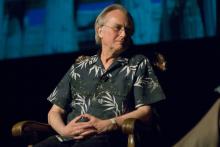
First things first: with all due respect to interim host John Oliver, I for one am thrilled to have Jon Stewart back on The Daily Show. I know it is sad to say, but I actually missed him while he was on summer hiatus. Welcome back, little buddy!
Last night, Stewart interviewed Richard Dawkins, author of The God Delusion, who was promoting his newest title, An Appetite for Wonder. The most interesting moments in the interview revolved around Stewart’s question to Dawkins about whether science or religion ultimately would be responsible for hastening our journey down this path of apparent self-annihilation. What followed was a fascinating, if not entirely satisfying, dialogue about the “downsides” of both disciplines.

Turning our faith into a set of rights and wrongs is partially based upon our own insecurities, but our fears are often warranted by how others respond to us.
“You attend that church?! Oh, that’s your pastor?! You went to that seminary?! You’re reading that book?! You like that theologian?! You belief that?! You like that type of worship?!”
It’s happened to us all at least once — someone labels our faith as wrong.
Question after question, one after another, on a daily — almost hourly — basis. If we aren’t careful, our faith and spirituality can quickly devolve into a set of distinct questions and responses.
In a corporate culture driven by hard data, statistics, evidence, trends, sales, surveys, and measurable information, our beliefs can be treated like a quarterly business summary — dissected, analyzed, and studied.
Our relationship with God turns into a cold and calculated set of methodologies, hypotheses, and professional-driven structures — the intimacy, raw communication, and love slowly disappears.
The mystery of God becomes something meant to be overcome, explained and defeated. And our church institutions become modeled after Fortune 500 companies instead of reflecting the vibrant early church communities of the New Testament.

I am an evangelical.
But what does that label even mean anymore?
A few days ago I was sitting around chatting with a few new friends at my Bible college. One of them was a young Canadian and another was a middle-aged former U.S. soldier. We ended up on the topic of politics and how many companies and businesses in the United States give millions to political and social causes and somehow we ended up talking about McDonalds.
My USAF friend made the statement: “McDonalds is terrible because it gives millions to causes and organizations that you [speaking of me] directly oppose: LGBTQ rights campaigns, Planned Parenthood, etc.” I was taken aback because my new friend simply assumed that because everyone in this conversation was an evangelical meant that we all held a certain set of political ideals and social standards. For him — for millions of others — evangelical meant something far more than a theological persuasion. In the midst of this awkward moment, I decided to reveal my identity as a politically progressive/liberal evangelical, which automatically caused an immense amount of tension to arise in our conversation. How could I, a Bible-believing evangelical, possibly support the LGBTQ community’s right to marry? How could I think that Planned Parenthood was doing any good and that President Obama’s plan to rapidly decrease the numbers of abortions in the United States was progress in any way? Let’s just say that the conversation ended on a pretty tense note.
This encounter really caused me to re-reflect on the magnitude that the term evangelical has been hijacked by political and social agendas over the past decade and how a new generation of evangelicals is emerging that does not at all identify with any of the social and political baggage that has come to represent evangelical Christianity. Which brings me back to my original question: What does the label evangelical even mean anymore?
I can tell you this — it doesn’t mean that I am a Republican. It doesn’t mean that I am a Democrat. It doesn’t mean that I am pro- or anti-anything.

Too much religion can harm a society’s economy by undermining the drive for financial success, according to a new study in the journal Social Psychological and Personality Science.
The study of almost 190,000 people from 11 religiously diverse cultures is raising eyebrows among some of England’s religious leaders for suggesting Judaism and Christianity have anti-wealth norms.

Microsoft CEO Steve Ballmer’s surprise decision to retire does more than throw the technology industry into a frenzy of speculation. It raises the problem of succession.
From major corporations to startups led by visionary leaders, from universities to churches, the departure of the top leader can stop momentum and usher in months, perhaps years, of uncertainty.
Even though dealing with succession is a primary task for a board of directors — some say it’s their preeminent task — relatively few boards take the assignment seriously. They focus instead on the easier work of jousting with the top leader and shilling for institutional investors.
What should be an orderly process of preparing for leadership transition instead becomes a lurching from one standalone regime to the next.
Many board members want the rush of being co-managers of the institution. This is especially true in churches, where boards enjoy making day-to-day decisions about operations. Since a strong central leader would get in their way, many church councils discourage strong clergy and reward compliant permission seekers.

Out of nowhere, I felt an urge to listen to Willie Nelson’s epic album Stardust, a collection of pop standards that went platinum when it was released in 1978.
As I listened to “Blue Skies” and “On the Sunny Side of the Street,” I remembered buying this album for my father. I thought he would enjoy a fresh take on these songs of his youth, his travails during the Great Depression, and the war that defined his generation.
I don’t think he ever listened to it a second time. He loved the songs, but he couldn’t bear the fresh take. He wanted Gertrude Lawrence, the original voices of Tin Pan Alley and Depression-era hopefulness, the crooners that carried his generation to war and back home again.
I understand. The music we hear at our first dreaming, first love, first dance becomes the soundtrack of our lives.
For many people, the same is true of faith. Our images of God, songs of worship and language of prayer tend to be those we acquired at first awareness. Many more images, songs and words will come later, but none might resonate so deeply as those that were imprinted on us early on.
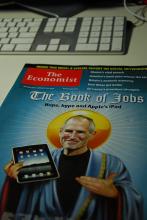
The new movie about Steve Jobs is short on anything explicitly religious. Like its main character, however, it’s got a thread of transcendence running through it.
The truth about Jobs and religion may be that, in this arena as in others, he was ahead of the cutting edge.
The film isn’t making the purists happy, in part because it takes too many liberties with history. But it’s not a documentary. I’ll go against many of the reviews and say that Ashton Kutcher does a pretty good job at representing the personality found in Jobs’ speeches and in what has been written about Jobs — particularly in the massive authorized biography by Walter Isaacson.
One quote in that book, from one of Jobs’ old girlfriends, pretty much captures the character in the film: “He was an enlightened being who was cruel,” she told Isaacson. “That’s a strange combination.”

I just got back a few days ago from a campsite outside of Asheville, N.C., the site of the third annual Wild Goose Festival. For those who are unfamiliar with the event, imagine and old-fashioned days-long outdoor revival, combined with Bonaroo and a traveling circus. For several days, authors, activists, artisans, musicians, and seekers converge to engage in spontaneous community, share ideas and to inspire one another.
It's not every day that you can walk by a makeshift tent and listen to Phyllis Tickle succinctly summarize the history of Christendom in 45 minutes, and then wander over and pick up a vegetarian pita sandwich while on your way to hear the Indigo Girls perform. Impassioned conversations emerge all on your walk about everything from child trafficking to the state of the institutional church in the 21st century. And you're only momentarily distracted by the guy on stilts, wearing a hat covered in goose feathers who wanders by for no apparent reason.
Welcome to Wild Goose.
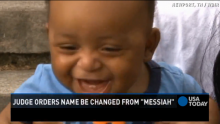
A Tennessee judge should not have barred a couple from naming their child “Messiah,” said the executive director of the American Civil Liberties Union of Tennessee.
On Thursday, the parents of the child appeared in Cocke County Chancery Court in Tennessee because they could not agree on a last name.
Child Support Magistrate Lu Ann Ballew ordered the mother, Jaleesa Martin, to change her son’s name to “Martin DeShawn McCullough.” It includes both parents’ last names but leaves out “Messiah.”
“The word Messiah is a title and it’s a title that has only been earned by one person and that one person is Jesus Christ,” Ballew told the 7-month-old’s parents.

The “secular world” has liars and thieves, adulterers, cheaters, and hypocrites. It’s a place full of child molesters, domestic abusers, and addicts. Where loneliness is rampant, mental illness is on the rise, and individuals routinely try to numb their pain via drugs, alcohol, and sex. Divorce is everywhere, pornography infects the minds of millions, and infidelity occurs on a regular basis.
The church often presents itself as an alternative to the “real world,” a place where these things don’t exist.
Many churches refuse to admit that these problems are affecting them. In reality, there is little statistical difference between Christians and non-Christians relating to these issues. Christians don’t receive a special pass that protects them from experiencing mental illness, suffering, struggling with addiction, abusing other people, being abused, or failing.
Our faith in Christ gives us hope and strength and courage, but it doesn’t erase reality, and it isn’t meant to create a flawless utopia where we can escape from the world’s problems. But many churches attempt to do just that — trying to create the perception of perfection.
In some church communities, there is the appearance that porn, sexual abuse, and rampant sin don’t exist. Even non-sinful things (mental illness, poverty, etc.) are treated as stigmas that are intentionally shunned. This is often misinterpreted as holiness — it’s not.

The truth is that our faith and spirituality is often dependent on hundreds of different relationships, factors, institutions, and circumstances that we directly correlate with God.
When our Christian expectations are shattered, it’s easy to blame God. We mistakenly idolize the things that are associated with God, and assume that if one of these aspects failed then God failed.
“Christianity” will fail us. Our churches will attack, our pastors will lie, our mentors will manipulate, our friends will betray, and when this happens, our beliefs will be shaken to their core.

I live in Texas. To many of its millions of residents, it is the greatest state in the union. We like things big and we like them to be bigger than every other state blessed to be in the Union. Texans are proud of their state; chalk it up to early indoctrination of Texas history throughout the life cycle of Texas Public Education.
But being in Texas, especially East Texas, means that we are sitting squarely and firmly in the buckle of the Bible Belt. The Bible Belt is a term used to describe the area where conservative Christianity is the prominent player in the state’s religiosity; generally this term refers to a high level of conservative, evangelical Christians. This does not mean that you can’t find conservative, evangelical Christians outside of this arbitrary boundary, but for some reason they seem to cluster in these areas in high concentrations.
I didn’t grow up in a church that beat people over the head in church or judged people for they way they acted. I felt loved and welcomed in a place where people were friendly and they loved serving God. I learned about Christ and God’s love for humanity. It wasn’t until I was older that I began to hear more Christians speak more and more on the necessity of evangelizing to people or even being “saved correctly.” I can remember on several occasions a certain church in the town I grew up in going door to door and asking people if they were to die tonight would they go to Heaven. I can remember thinking that it was an odd tactic to get people to come to church. It seemed so stand offish and so self-righteous that it left a bad taste in my mouth.
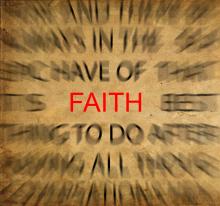
WHICH SCRIPTURES WILL our biases tempt us to sidestep this month? Perhaps 2 Timothy? Not usually the favorite of radicals. Whether actually written by Paul just before his death or worked up later by followers, the letter has a certain poignancy, suggesting the waning of Christianity’s pioneer phase. The church is in for the long haul. Its faith needs to find forms that can be transmitted across generations. It needs patient leadership that will be consistent in the face of inauthentic mutations of the gospel, religious imposters, and the distraction of futile controversies—hence the emphasis on sound teaching, the internalized treasure of the creed.
Let’s honor this recognition within scripture itself that the gospel needs institutions. The church must even risk banality in some of its teaching practices. A great interpreter of the Christian mystical tradition, Friedrich von Hügel, invites us to respect the way radical teachings have to be given forms that can be handled by regular folks, not geniuses. “Is there not a pathetic instruction in watching the insertion of the copper alloy into the pure gold ... that is, a metal sufficiently resistant to the clumsy handling of the multitude to be able to persist in the transmission of a value, and indeed a precise value, even though it be not the highest. There is surely a pathos here most thoroughly characteristic of the abiding limitations and homely needs of our poor humanity.”
When the Pharisees heard that [Jesus] had silenced the Sadducees, they gathered together, and one of them, a lawyer, asked him a question to test him. “Teacher, which commandment in the law is the greatest?” He said to him, “‘You shall love the Lord your God with all your heart, and with all your soul, and with all your mind.’ This is the greatest and first commandment. And a second is like it: ‘You shall love your neighbor as yourself.’ On these two commandments hang all the law and the prophets.” —Matthew 22:34-40
FAITHFUL PEOPLE are often stubborn people. Cambodian Buddhists are no exception. Truth-seekers in Cambodia sometimes spend a year living as beggars. They walk from village to village, trying to avoid the millions of remaining land mines. Their only possessions are a bright orange robe and a beggar’s bowl. After the ravages of Pol Pot and the Khmer Rouge regime, which dismantled community trust one forced-labor camp at a time, one might think the Buddhists would write off this ancient tradition, for no other reason than that it is grounded in the blind trust of perfect strangers. But faith, as Jesus taught, needn’t be any larger than a mustard seed. No regime, regardless how brutal, can eradicate faith.
This Cambodian Buddhist tradition of giving your entire well-being over to a community of strangers is one that has something to say to those of Christian faith. Giving yourself over to poverty, over to those who don’t know you from Adam, must change a person. After spending a year as an intentional beggar, as theologian Barbara Brown Taylor notes, you’d be hard pressed to differentiate yourself from all those “others” we tend to pity, fear, admire, or despise.

Rather than a Third Great Awakening I believe we are standing in the threshold of a Great Grace Awakening. It’s a move of the Holy Spirit drawing people away from legalistic and fear-based beliefs to a place some of us would call grace.
On the surface, it may seem to fly in the face of some traditional Judeo-Christian ethics. But it is aligned with a broader, more universal ethic that seems to be developing around genuine Christian love and grace — the very essence of Jesus’ ministry and what makes it so revolutionary — as guiding principles.
Grace is the reason for the incarnation. God became human and walked in our sandals because God knows us and wants us to be known.
Grace says that there is nothing we could ever do that would make God love us less. And grace tells us that there’s nothing we could ever do that would make God love us more. You are loved simply because you are and for all of who you are. Full stop.

Are you feeling a bit smug about the way historian and author Reza Aslan out-debated Lauren Green on Fox News on Friday, July 26? The clip of the interview about his new book, Zealot: The Life and Times of Jesus of Nazareth, has become a YouTube sensation with almost 3 million views in four days and much of its popularity is due to liberals gloating over Lauren Green’s obvious embarrassment at being out maneuvered on her own show. From her opening question it was clear she was itching for a fight.
Punch
Here’s her opening salvo: “You’re a Muslim, so why did you write a book about the founder of Christianity?” This was less a question than an accusation. A Muslim, she seemed to be saying, who is writing about Christianity must have an agenda and we all know what that is – to destroy Christianity! She followed up for the first 5 minutes of the interview with questions that simply cited others making the same accusation, cynically pandering to her audience with what she hoped would be a knock-down, drag out boxing match in which she would put this arrogant Muslim masquerading as a “scholar” in his place. To her chagrin and the delight of liberals everywhere, Aslan came prepared for battle.
Counter-Punch
Aslan defended himself against her accusation of bias with a clever feint. He redirected her attack by agreeing that of course, he is a Muslim, but that is not the critical component of his biography. Here’s his answer to her opening question as I transcribed it: “To be clear, I am a scholar of religions with four degrees including one in the New Testament, fluency in biblical Greek who has been studying the origins of Christianity for two decades who also just happens to be a Muslim. It’s not that I’m just some Muslim writing about Jesus. I am an expert with a PhD in the history of religions.” He mentions his credentials four more times during the interview. His point? How could you accuse me of having a hidden agenda when I am an academic scholar only interested in the facts? Historians, he wants Ms. Green and all of us to believe, are bias-free pursuers of the truth. The unspoken accusation is that Ms. Green is not interested in the truth and is in fact the one with the agenda, which is to destroy Islam and defend Christianity against any and all attacks.
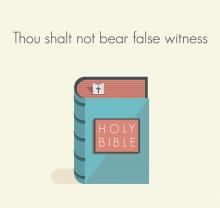
"And God spoke all of these words…You shall not give false witness against your neighbor." Exodus 20:1, 16
Several months back I overheard a conversation in an office waiting room. A young, 20-something guy entered the waiting room with his board shorts on and his windblown hair haphazardly tucked beneath his backwards baseball cap as though he’d just come in from surfing – not uncommon in the beach community of Jacksonville, Fla. He strolled confidently to the receptionist and asked her a question about the availability of a person he wanted to see, made an appointment, and it seemed his business was done and he’d be on his way. Instead he asked the receptionist where she was from, if she liked her job, and then talked about the weather. He then began to tell her about a Bible study he was leading and a little about his faith journey – for the longest time he felt lost, was starting to get in trouble, then he found Jesus, was born again, and began to set his life straight.
After sharing his testimony he asked the receptionist, “What religion are you?"